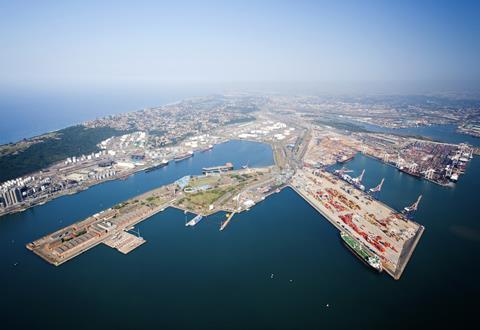The legal issues surrounding investment in Durban’s Pier 2 container terminal will take time to resolve, according to Justin Chadwick
South African citrus industry sources have said the recent order in the Durban High Court to intervene in a port investment deal will have a ”serious impact”, and will delay private sector involvement in Durban’s container terminals.

“The legal process must play out and all parties are entitled to exercise their rights,” noted Citrus Association (CGA) chief executive Justin Chadwick.
In briefing citrus growers on the latest development, Chadwick said the court issued an order interdicting Transnet to engage and advance further with International Container Terminal Services Inc (ICTSI), the approved partner to operate Durban Pier 2 container terminal.
The second part of the application brought by APM Terminals was still yet to be brought before the courts, he said.
“Part B is the application against the awarding of the partnership to ICTSI,” Chadwick noted. “Since it took six months for the courts to hear the application of Part A, it could be safe to assume Part B would presumably only be set down for the New Year.
“In essence, we suspect that ICTSI would not take or assume operational control of Pier 2 for some time yet.”
In assessing the impact on the citrus industry and specifically for growers of the northern regions of the country, Chadwick said if the deal had been implemented, there would be some positive impact on streamlining operations in the short term.
“However, it would take anything from six months to 12 months for any meaningful change in productivity merely due to the major challenge with equipment and the need to procure a full complimentary and functioning equipment portfolio.”
The deal would also have resulted in competition between any private operator and Transnet Port Terminals and specifically Pier 1, Point and Maydon Wharf terminals.
Chadwick noted that if any private partner were to increase productivity by 100 per cent, from, for example, 12 gross crane moves per hour to 25 gross crane moves per hour and above, it would immediately increase berthing capacity by up to 100 per cent.
This would mean ships and containers moved faster and the turnaround time would be very attractive for shipping lines to work ships at Pier 2, as opposed to other terminals.
It could even make Pier 2 an attractive proposition for ships that aligned to Ngqura Container Terminal in the Eastern Cape, with any significant shift resulting in it becoming a major hub for the region.
“I believe there would also be meaningful and substantial back of port terminals and inland rail terminals developed to greatly enhance the throughput of containers by utilising rail transport in conjunction with road transport,” said Chadwick.
If the application of Part B goes against the joint venture, the agreements between Transnet and ICTSI would then be null and void, he outlined, with a new request for proposals and renewed application process then set in motion.
“Therefore, Transnet will still pursue private partnership for Pier 2,” Chadwick added. ”Pier 2 would then continue in its current form until the time an approved partner resumes control.”



